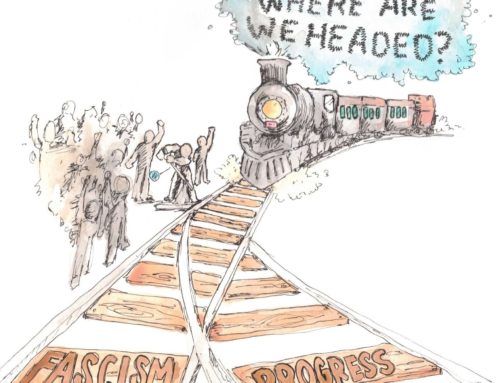Aspirations for society-changing careers frequently take form at nonprofits*. This is partly because they provide jobs; nearly 7% of them in the United States, and partly because they appear to involve less cynical compliance with the status quo than so-called “corporate” jobs.
Despite your analysis of capitalism and ways to move beyond it (or reforming it, if you don’t believe in anything better), it’s likely that you believe a preliminary step to any sort of massive change to the empire in developing a more progressive and critical political climate in all social contexts. Because the social context created by the nonprofit sector is determined by the constraints of government contracts, foundation and government grants, and individual donations, non-government organizations (NGOs) are limited in their role as an incubator for progressives practice.
Even with the increase in the collective realization that “the system” does not work in our interest, nonprofits might still be imagined as a wholly independent force at play. Although there’s a few ways in which nonprofits can aid the development of a mass movement, they coauthor our current government’s main narrative: reconciling the management of public outrage and the legitimization of corporations’ profit-motives implicit in the systems of accountability between funders and charities.
Although it might not appear as though nonprofits’ contribute to our current crisis of political apathy, some of us that have worked in nonprofits know that they play a special role in the indoctrination and pacification of potential radical change-makers. On the point about managing (and pacifying) public outrage, we see this in the form of nonprofits’ pretension that they play a crucial role in the “community”. The problem is arises when nonprofits claim to be agents of social change, when in reality they’re just providing services. Of these services only some should be considered necessary in the context of a necessity for a mass movement. For example, if we compare the provision of shelter for the homeless with shitty shrub-planting volunteering “opportunities”, it’s easy to identify which one is actually helping people grow.
Nonprofits rarely participate in any sort of popular education practice that is guided by participants’ input, and when it’s there, it usually includes a low number of local residents. Consider that in my former workplace, a nonprofit with a strong reputation among other nonprofits in the county, the term “community” is interchangeable with “nonprofit community”. At least there’s moments of transparency.
The problem is that, although nonprofits could benefit from transitioning into donor-based funding structures, receiving money from the people they are directly benefiting or from those who believe in charity, they are stuck in strategies that are dead-end practices for movement-building. They are not germinating in communities with a commitment to self-determination and political outrage appropriate in our current crisis. The problem isn’t present as much in the strictly charity ones as in the advocacy ones. These claim to represent the working class and work under the notion that the current legislative system is the appropriate venue for the advancement of society. Basically, the justification for nonprofit advocacy is that they understand what the needs of the people are as defined by forms of social aid that are, and have been, provided by the state, without necessarily caring to imagine and fight for advancements that would eliminate the conditions that create a need for institutional charity. In response to their faith in electoral politics I’d ask: In what time frame will we reach a desirable society? Will it happen before environmental destruction and profit-based wars kill millions more? And what is it that we agree with when we fundamentally agree with the system, imagining change as a set of undignified reforms only?
“Community organizations” advocate on behalf of charity and state-sanctioned rights because charity and the state are what sustains them. In fact, nonprofit employees in executive positions commonly make six-figure salaries. It is difficult to expect working class solidarity from individuals making this much, especially when poverty is the condition that gives them a job in the first place. What’s more problematic is what INCITE! (organizers of the 2004 conference, “The Revolution Will Not Be Funded: Beyond The Non-Profit Industrial Complex”), points out as one of elements that creates the nonprofit industrial complex, “[redirecting] activist energies into career-based modes of organizing instead of mass-based organizing capable of actually transforming society”. The result: nonprofits adopt campaigns that involve mobilizing about 20 people that actually aren’t getting paid to be at their business-as-usual protest, they get media coverage for it, and there it is, proof that there are activists in the community for the small audience that’s paying attention. The appreciation I get from people that hear I work on an advocacy project at a nonprofit speaks to the misguided, detrimental reliance in the nonprofit sector. It seems as though institutional charity is actually considered a pathway to progress.
Perhaps when the crisis of capitalism starts to affect everyone more directly, we’ll finally see the ineffectiveness of nonprofits as agents of social change. We’ll look back at their request for phone calls to x representative to end x budget cuts and realize the whole electoral system they bet on was already bought with ridiculous campaign contributions. We’ll see that they didn’t take care of the work that is empowering people with an accurate roadmap to progress, showing what the dead-ends are, and how urgent the need for organized resistance are right now.
* the term nonprofit here excludes universities and hospitals, which technically fall into the same category.






[…] these institutions use them for their own benefit. Instead of building a mass movement, they manage public outrage. Instead of developing radical or revolutionary militants, they develop social-worker activists […]
[…] for their interests, NGOs use them for their own benefit. Instead of building a mass movement, they manage public outrage. Instead of developing radical or revolutionary militants, they develop paid but ineffective […]
[…] their interests, NGOs use them for their own benefit. Instead of building a mass movement, they manage public outrage. Instead of developing radical or revolutionary militants, they develop paid but ineffective […]
[…] for their interests, NGOs use them for their own benefit. Instead of building a mass movement, they manage public outrage. Instead of developing radical or revolutionary militants, they develop paid but ineffective […]
[…] these institutions use them for their own benefit. Instead of building a mass movement, they manage public outrage. Instead of developing radical or revolutionary militants, they develop social-worker activists […]
[…] for their interests, NGOs use them for their own benefit. Instead of building a mass movement, they manage public outrage. Instead of developing radical or revolutionary militants, they develop paid but ineffective […]
[…] these institutions use them for their own benefit. Instead of building a mass movement, they manage public outrage. Instead of developing radical or revolutionary militants, they develop social-worker activists […]
[…] 政治活動正在被資本化和專業化。與組織群眾為自己的利益而鬥爭不一樣,NGO利用群眾去成全組織自己的利益。NGO沒有建立群眾運動,而是管理公眾的不滿。NGO沒有發展激進或革命的戰士,而是育成被動的受援者和受薪的無能活動家。 […]
[…] họ cho lợi ích của bản thân. Thay vì xây dựng một phong trào quần chúng, NGO quản lý sự phẫn nộ của công chúng. Thay vì tạo ra sự cực đoan hay các chiến binh cách mạng, họ tạo ra các nhà […]
[…] interests, NGOs use the masses for the NGOs’ interests. Instead of building a mass movement, they manage public outrage. Instead of developing revolutionaries, they develop paid but useless activists. They also create […]